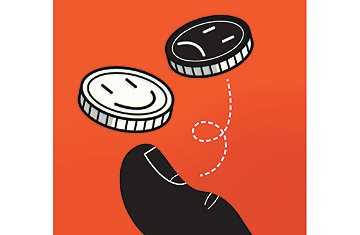
Why you're not in the mood. In emotional economics, how we feel can predict how we deal with the markets
Winter has been a season of surprises, and spring is ripe for more. The richest, most electable candidate in the Republican primary race is losing ground to a man who doesn't believe in evolution. Millions of homeowners remain underwater, yet rents are rising. The unemployment rate is falling, but the temperature of protectionist rhetoric is heating up. Even culture is bucking the conventional wisdom: highbrow nostalgia show Downton Abbey is a hit, while high-tech sci-fi flick John Carter bombs.
This all seems confusing and contradictory, but it makes perfect sense to people in the burgeoning field of emotional economics. Investment expert Peter Atwater, head of consulting firm Financial Insyghts, which studies the effects of consumer mood on markets, says that since the financial crisis in 2008, our mood has been closed in, negative, fearful and isolationist.
He calls it the me, here, now era, in which we crave things safe, familiar, nostalgic and local. And it's not something that a few months of better economic data can fix, given that it's rooted in a deep sense that the world is still a highly volatile and uncertain place, even if the economy seems temporarily better. This is an era characterized by a preference for stocks that pay predictable dividends, the locavore movement and renting rather than owning (think houses but also Netflix, Zipcar and all the websites through which you can lease everything from clothing and baby gear to kitchenware and accessories).
It's also marked by more-extreme politics, which tends to cater, like foraging, to a me, here, now ethos: witness not only the unexpected rise of Rick Santorum but also the serious surge of isolationism in Europe, where border-control measures and scary right-wing parties are expanding. Even mainstream politicians like French President Nicolas Sarkozy, who is running for re-election, are calling for tighter markets, which favor local companies, and restrictions on immigration.
It's a far cry from the late '90s, when Europe's single currency, the euro, was formed. Then we were having an us, everywhere, forever kind of moment. The dotcom bubble hadn't yet burst, everyone was getting rich (or seemed to be), and consumer confidence was at record highs. No wonder the S&P 500 was soaring and dotcom "concept" stocks that stretched beyond national boundaries and rational valuations seemed logical. When confidence is high, anything seems possible.
Which is perhaps why it's impossible today to imagine why anyone thought that countries as disparate as Germany and Greece could ever be part of a common economic and political bloc. Europeans themselves don't believe it, and it's that lack of belief, rather than any real lack of funds, that thwarts them in acting decisively to save the monetary union.
